- Home
- David R. George III
Star Trek: Typhon Pact: Plagues of Night Page 7
Star Trek: Typhon Pact: Plagues of Night Read online
Page 7
Sisko raised his arms, then dropped them to his sides, the padd he carried in one hand slapping against his thigh. “I’m a danger to her,” he said. “The Prophets said so.”
“The Prophets warned you about spending your life with Kasidy,” Kira said. “They didn’t caution you against having time with your daughter.”
“If I go back to Bajor, Kasidy will push for us to be together,” Benjamin said. “That can’t happen. It’s too dangerous—not for me, but for Kasidy and Rebecca.”
“Kasidy doesn’t believe that—” Kira started, but before she could finish, Benjamin turned and started away from her again. “Kasidy doesn’t believe that, but she knows that you do,” she called after him. “If you’ll spend time with Rebecca, see her regularly, Kasidy will endorse the papers you submitted to the courthouse in Adarak.” Sisko stopped and peered back over his shoulder. “She doesn’t want to, but she’ll agree to end your marriage for the sake of your daughter.”
“Kasidy wants me to resign from Starfleet?” he asked. “Return full-time to Bajor?”
“She wants you to be a part of Rebecca’s life,” Kira said. “You don’t have to live on Bajor. You don’t even have to leave Starfleet or even the Robinson. You just need to take regular leave to spend time with Rebecca.”
Slowly, Benjamin made his way back over to Kira. “Even so, it will be difficult because of my situation with Kasidy.”
For the first time since they’d begun speaking, Kira did not feel sympathy for her friend. “Since when did—” She’d wanted to say the Emissary, but successfully fought the impulse to do so. “—you shy away from difficult circumstances? Especially when it involved the welfare of someone you love?”
Benjamin said nothing, but Kira could see him considering her words.
“This is for your daughter,” Kira pressed. “She’s doing well, but she needs her father.”
“I know,” Benjamin said, his voice almost inaudible.
They stood that way, in hushed tableau, for drawn-out moments. Kira heard the rasp of insects nearby, and the twitter of birds. She watched the Emissary closely, waiting to see if her words had reached their mark.
“Thank you,” Benjamin finally said. “Tell Kasidy … tell her we’ll talk.”
Kira didn’t know if that meant that he would agree to his wife’s proposal or not. She wanted to know, wanted to ask, but she felt as though she’d already tested the bounds of her friendship with Benjamin. Instead, she simply said, “I will.” She regarded the man who, despite becoming a religious icon to her, also remained her friend, a man she loved and admired apart from his role as the Emissary.
Less out of habit and more from a desire to confirm that her friend would be all right, Kira reached for Benjamin’s ear. He stepped back quickly, almost as though he thought she meant to slap him. Her hand frozen in the air, Kira said, “I’m sorry. I was just going to assay your pagh.” The last time she had done so, back on Bajor more than a year earlier, Kira had come away with the assessment that Benjamin’s essence had been deeply wounded. She hoped now to find that he had begun to heal.
“I know what you meant to do,” he said evenly. “But I’ve played my part as the Bajoran Emissary. I’m done now.”
She lowered her arm. “Benjamin—” she began, but he interrupted.
“Thank you for coming to see me, Nerys,” he said. “It was good to see you.” He turned again and strode back along the path the way they had come.
This time, he didn’t stop.
5
Filled to capacity, the Cailax Auditorium hummed with animated conversation. From the wings, Spock listened, satisfied with the attendance at the event, as well as with the reception that the first four speakers of the evening had received. As he watched Corthin pace across the stage toward the lectern at its center, he took note of an increase in both the amount and the volume of the chatter in the hall. It reconfirmed for him an observation he’d first made a month earlier: the stately schoolteacher had become a recognized and popular face for the cause of Vulcan-Romulan reunification.
Clothed conservatively in dark brown slacks, emerald blouse, and black dress jacket, Corthin approached the podium. A thread of applause began to weave its way through the audience, then quickly spread to the full house of more than a thousand. For longer than a year, ever since Praetor Tal’Aura had agreed to allow the Movement to conduct itself openly and without fear of reprisal, Spock and the other leading proponents of reunification had taken their cause directly to the Romulan people. That the praetor had exploited the Movement, using it as a drumbeat to stir up sentiment to unite the sundered Empire, did not matter. After Tal’Aura dissolved the runaway Imperial Romulan State and made the Romulan Star Empire whole again, she suffered her own demise, but Vulcan-Romulan reunification continued as a viable cause—and thanks to the new praetor, Kamemor, championing that cause publicly remained safe and legal.
On the stage, Corthin waited for the clapping to fade away. In early middle age, she stood out in no particular way. Of average height and weight, with a physiognomy that did not rate a second look, she might have generated interest in the Movement by essentially standing as the epitome of the average Romulan citizen. Certainly her role as an educator of young students, rather than as somebody in a position of political or military power, appealed to many who had begun paying attention to the public debate in which she participated.
“To those of you here in the Cailax Auditorium,” she started as the applause sputtered into silence, “to the residents here in Villera’trel, to the inhabitants of Romulus, to people throughout the Empire, and to Romulans everywhere, good evening.” Though not broadcast live, the recorded rally would later appear on the comnets.
As always, Corthin carried no prepared text with her, nor had she committed any specific words to memory. Where Spock preferred to orate from a carefully crafted discourse, segueing from one point to the next in a manner designed to compel, Corthin contended that it served her to make her case not simply out of facts and sheer logic, but from the weaving together of opinion and passion. Spock could not dispute that the juxtaposition of her Romulan style and his Vulcan methodology worked well to underscore their overall message that a marriage of the two cultures would enhance both, creating a whole greater than the sum of its parts.
“My name is Corthin, and I am an educator,” she continued. “I was born here on Romulus, in Ki Baratan, back in one of those heady periods when the capital had been redubbed with one of its ancient names, Val’danadex Trel. During my childhood, the designation of the city changed several times. The various names always harked back to an earlier time, and it continually intrigued me to discover why a particular name had been restored, and why it had been used—and then disposed of—in the first place.”
D’Tan stepped up beside Spock and peered from backstage at Corthin. “What is she talking about tonight?” he asked in a hushed voice.
Without turning toward D’Tan—still a young man even after spending nearly a decade and a half associated with the Movement—Spock replied quietly. “I believe Corthin is speaking, as she always does, of her personal reasons for supporting reunification.”
“Yes, of course,” D’Tan said. “But I mean that I’ve never heard this story.”
“The variations with which Corthin elucidates her consistent thoughts about reunification are notable,” Spock said. More than anybody else he had met within the Movement, and perhaps even more than Spock himself, Corthin persistently found new approaches to voice the belief that bringing the Vulcan and Romulan cultures back together would redound to the benefit of both. In Spock’s estimation, her overall method of advocating for reunification spoke to the broadest number of people, which likely accounted for the recent and significant increase in her popularity.
“As a child,” Corthin continued, “I often wondered about the residents of the original Val’danadex Trel, and how they differed from the people who dwelled in the modern city. What similarities
did the inhabitants of the first Dartha share with those of the most recent version of the city? What would be lost or gained if the Ki Baratan of antiquity could coexist with the Ki Baratan of today?
“Millennia ago, the Angol’rey first established a settlement that, after growing across many generations and a war-torn history, would eventually become the beating heart of the Romulan Star Empire. Back then, the colonizers recognized the value of the land, situated in temperate climes on the Apnex Sea, with abundant fresh water available from the two great rivers that ran nearby. Centuries later, the Five Great Clans created the Imperial Assembly, the precursor of our Senate.
“Often, I think, when we consider our forebears, we gauge them as primitive, as something less than our society of today. Technologically, that’s true, and in terms of magnitude: the Empire comprises not merely a single world, nor two, but many. And our political influence and military might reach far beyond that, into spheres populated by Gorn and Tzenkethi, by Breen and Tholian, and even by Klingon and Terran. But in terms of who we are as a people, are we so dissimilar to those who came before us? Are we not, in some meaningful sense, just a slightly modified form of our antecedents?”
Spock glanced away from Corthin and over at a bank of displays that observed the auditorium. Three of them presented views of the stage, one of them from close range, two from farther away, while several others showed various locations behind the scenes. Spock checked the remaining screens, which monitored different sections of the crowd. It did not surprise him to see the audience sitting rapt, their attention unwaveringly on Corthin. Indeed, the beginning of her speech had easily captured his own notice.
“In my youth, during my early school years,” Corthin continued, “I first became aware of the historical connection between our people and the Vulcans. It fascinated me to learn that we had come from somewhere else, from somebody else, and that the place and the people from which we sprang still existed in the universe. I immediately wished to—”
Footsteps quickly neared, and a hand fell on Spock’s shoulder. He turned to see the short but muscular form of Venaster, a former military officer and a longtime supporter of reunification. Together with a man named Dorlok, he supervised the security needs of the Movement. “I’m sorry to disturb you just before your address,” Venaster said, “but I thought you’d want to know that we’ve had an incident.”
“What’s happened?” asked D’Tan, ever excitable, despite his seemingly paradoxical commitment to the Vulcan way of life.
Spock reached up and guided Venaster by the elbow, moving him away from D’Tan and into an empty corner of the offstage area. “Tell me,” Spock said.
“Protesters interrupted the event in Vela’Setora,” Venaster said. “There was an altercation.”
“Involving our people?” Spock wanted to know. Even with the new praetor’s willingness to allow the open discussion and even the promotion of reunification, the entire concept of free speech within the Empire lived a fragile existence. Spock and his comrades strived never to provide any justification for the praetor or the Senate to criminalize their advocacy.
“No, not directly,” Venaster said, not hiding his relief at being able to truthfully report the news. “But some of those who attended the event to listen to our people confronted the protesters.” He held up a data tablet. “We have a record of what transpired.”
“Show me,” Spock said. Venaster positioned the tablet so that both men could view its display. The security officer touched a control, and a still image of Corvalet Sharana appeared. An older woman, her hair shot through with streaks of gray, she nevertheless practiced a fiery brand of oratory. On the screen, she stood on an outdoor proscenium before a large crowd. Venaster worked the data tablet, and the recording began to play, a symbol in the upper right-hand corner indicating that the sound had been muted. In silence, Sharana moved across the stage, addressing her audience, her gesticulations broad. It intrigued Spock that some of the most emotional Romulans he’d ever met sought reunification, and a mix of Vulcan calm with their Romulan passion.
After a few seconds, the view on the tablet changed, swinging around to focus on the audience. Among arcs of concentric benches, perhaps twenty rows from the stage, a man and a woman stood in an aisle with their arms raised above their heads, each of them holding up a data canvas. Both electronic placards displayed the rounded, blockish characters of the Romulan language. One, presented in a font clearly designed to appear handwritten, read ROMULANS FOR ROMULUS in large letters, and below that, smaller, IT’S LOGICAL! The other carried the sentiment, WE EVOLVED FROM VULCANS—WHY GO BACK?
Although no sound accompanied the playback, Spock could see the mouths of the protesters opening wide, obviously voicing their dissent in loud tones. He also saw several members of the audience clearly yelling back at them. After a few moments, a number of individuals left their seats and advanced on the protesters. The two sides appeared to exchange heated words, until finally one of the men from the audience threw a punch at the male protester. A couple of people attempted to break up the physical conflict, but in just seconds, several other scuffles erupted.
The irony of the episode—taking place as it did at a proreunification event—did not escape Spock. At least in part, the goals of melding back together the Vulcan and Romulan cultures included bringing the ideals and the practice of emotional restraint to the Empire. On Vulcan, such a brawl would never have taken place.
On the display, Spock saw Romulan security officers descending on the scene, disruptors at the ready. He knew that their presence at the rally had nothing specifically to do with reunification; they conspicuously attended all large public events, expressly for the purpose of preventing—or in this case, stopping—violent activity. It did not take them long to do so in Vela’Setora, fortunately without having to resort to discharging their weapons.
Venaster deactivated the data tablet and lowered it to his side. He looked up at Spock with an expression of concern. “If the praetor or the Senate or the Tal Shiar are looking for a credible reason to shut down our rallies,” Venaster said, “they might use this incident as justification.”
“If any portion of the government is searching for a rationale to recriminalize the Movement,” Spock said, “they might well have provoked, or even staged, this incident.”
Venaster nodded slowly. “I hadn’t considered that.”
“Obviously, we must consider all possibilities,” Spock said. “Were any arrests made?”
“I don’t know,” Venaster said. “This happened just a short time ago.”
“We need to determine the identities of the protesters, and of the individuals in the audience who confronted them,” Spock said. “Perhaps even of the Romulan Security personnel involved. Learn what you can about all of those people so that we can evaluate whether or not this altercation occurred organically. I’d also like eyewitness accounts from our people.”
Again, Venaster nodded. “I’ll begin immediately,” he said. “I also think we should increase our own security measures at the rallies.”
“Agreed,” Spock said. Behind him, he heard sustained applause in the auditorium, a sure indication that Corthin had concluded her remarks. He began walking back toward the stage, Venaster following along. “Keep me informed of any other unusual occurrences at reunification events, particularly those that could undermine our cause. If necessary, I will seek an audience with the praetor to reassure her of the intentions of the Movement, and to request her guidance, and possibly even her protection.” Four months earlier, not long after Gell Kamemor had ascended to the highest office in the land, Spock had met with her in order to gauge her judgments about reunification, and to appeal to her to keep public discourse about it legal. He’d found her reasonable and open, a much different Romulan leader than many of those who had preceded her in recent years—Tal’Aura, Shinzon, Hiren, Neral.
“I’ll solicit and coordinate reports from all of our rallies immediately,” Venaster sa
id.
“Very good.” As Spock continued toward the wings of the stage, to where D’Tan still stood, Venaster headed off in the other direction. Spock knew that the security officer had assigned several of his lieutenants to that evening’s detail, which under normal circumstances allowed Venaster to manage security needs across multiple Movement events.
The audience continued to clap as Corthin left her position at the lectern and made her way offstage. Her face a mask of calm, she betrayed nothing of any emotions she felt in the wake of her speech. When she reached D’Tan, the young man congratulated her enthusiastically on her presentation, praise which she accepted with equanimity.
“You seem to have captivated the audience,” Spock said.
“I believe they are receptive to our message,” Corthin said.
Spock allowed Corthin to pass through the narrow space, then started for the stage himself. “Vornta vel,” offered D’Tan; the phrase literally translated as fortunes many, and in essence carried the same meaning as the human phrase good luck. Spock did not respond directly to the words, but acknowledged his young comrade with a nod. Then he stepped out onto the stage and headed toward the lectern.
The ovation that had accompanied Corthin offstage had drifted away, but the audience began to clap again when Spock appeared—though not, as best he could tell, with quite as much enthusiasm. By the time he reached the podium, the applause had already begun to fade, and as he stood waiting to commence his remarks, it quickly ended. He took a moment to gaze out over the audience. He saw many faces peering back at him, though, unexpectedly, not all of them.
“I am Spock of Vulcan,” he said, his voice carrying out across the midsized hall. “I am a citizen of the United Federation of Planets, but I am also a legal visitor to Romulus.” He started each of his reunification addresses with such words, wanting to identify himself to the crowd. While many might know his name from the comnets, fewer would recognize him on sight, particularly since the stock video many of the news feeds often showed featured him in Vulcan ceremonial robes; that night, he wore beige slacks and a dark-blue tunic.

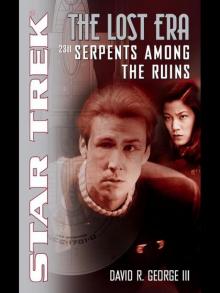 Serpents Among the Ruins
Serpents Among the Ruins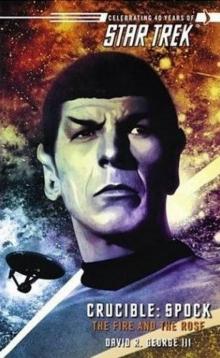 The Fire and the Rose
The Fire and the Rose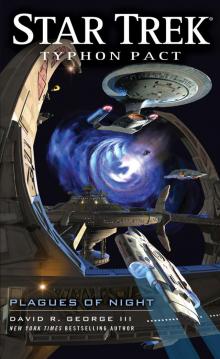 Star Trek: Typhon Pact 06: Plagues of Night
Star Trek: Typhon Pact 06: Plagues of Night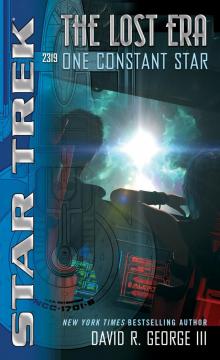 Star Trek: The Lost Era - 08 - 2319 - One Constant Star
Star Trek: The Lost Era - 08 - 2319 - One Constant Star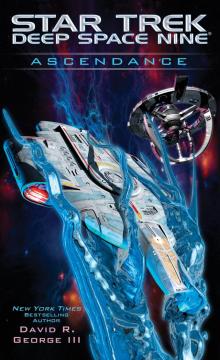 Star Trek: Deep Space Nine: Ascendance
Star Trek: Deep Space Nine: Ascendance Star Trek: TOS: Allegiance in Exile
Star Trek: TOS: Allegiance in Exile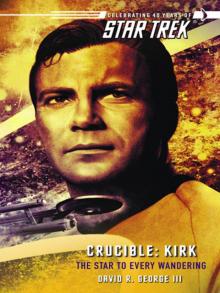 Crucible: Kirk
Crucible: Kirk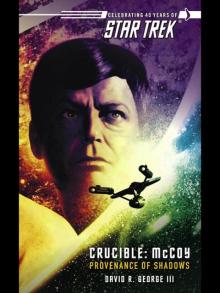 Crucible: McCoy
Crucible: McCoy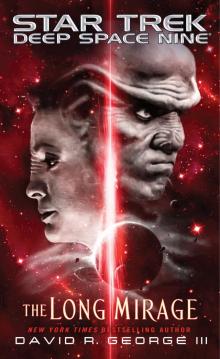 The Long Mirage
The Long Mirage Original Sin
Original Sin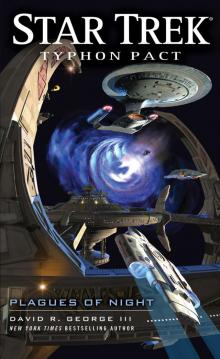 Star Trek: Typhon Pact: Plagues of Night
Star Trek: Typhon Pact: Plagues of Night Allegiance in Exile
Allegiance in Exile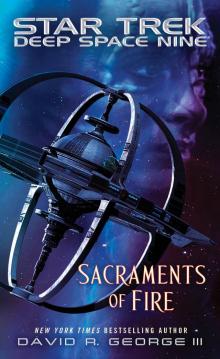 Sacraments of Fire
Sacraments of Fire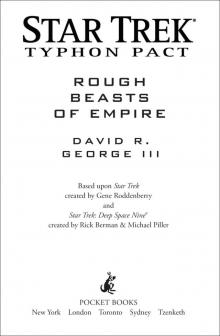 Star Trek: Typhon Pact: Rough Beasts of Empire
Star Trek: Typhon Pact: Rough Beasts of Empire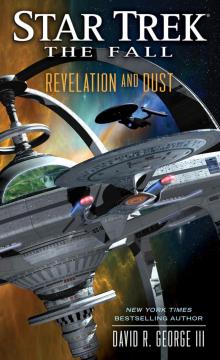 Star Trek: The Fall: Revelation and Dust
Star Trek: The Fall: Revelation and Dust